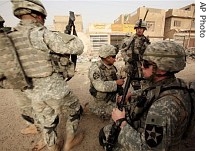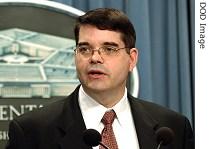2007年VOA标准英语-US 'Campaign Plan' Predicts Two Years to Establ(在线收听)
Pentagon
24 July 2007
A U.S. military spokesman has confirmed that the top commander in Baghdad and the U.S. ambassador have developed a new 'Campaign Plan' that sets a goal of establishing security in Baghdad and other population centers by June of next year, and throughout the country a year later. The plan was first reported in Tuesday's New York Times. It suggests a substantial U.S. troop presence over that period, but defense officials say troop levels will be determined as the security situation in Iraq develops. VOA's Al Pessin reports from the Pentagon.
Reached by telephone in Baghdad, coalition spokesman Colonel Steve Boylan told VOA he expects the lengthy, classified document - five months in the making and several centimeters thick - will be finalized this week. He says it sets goals for establishing security that include progress in military, political and economic efforts, but he says troop levels will be determined later, after officials see how their plan is going.
"It doesn't really address troop levels or troop strength," said Colonel Boylan. "This is more conditions-based type of document, type of planning. This is the strategic, big picture kind of planning that has to take place to give everyone else the direction they need to continue forward."
Colonel Boylan, chief spokesman for the top coalition commander, General David Petraeus, says the goals of establishing security in Iraqi cities by next June and throughout the country a year later could be achieved either sooner or later than planned.
 |
| US soldiers prepare to search homes in the Dora neighborhood of Baghdad, 28 June 2007 |
"The political line of operation, the political requirements, are the main idea, is the main focus," he said. "All the other operations that we are conducting, whether they're economic, security, governance, are all in support of the political line of operation."
Colonel Boylan confirmed that part of that political initiative is an expanded effort to promote reconciliation on the local level throughout Iraq, including reconciliation with armed groups that have been fighting against the coalition and the Iraqi government. A special unit headed by a British general has been established for that purpose.
Boylan says the Campaign Plan implements the strategy President Bush announced in January, and does not require approval beyond General Petraeus and Ambassador Ryan Crocker. But the New York Times reports senior U.S. officials have been briefed on the document, which the colonel says is now in the final editing stage.
 |
| Bryan Whitman |
"It would be incorrect and inaccurate to infer that there have been some sort of national decisions made, based on these plans," he said.
Whitman and Boylan also say the Campaign Plan is subject to change, if necessary, based on conditions in Iraq as they develop. Whitman put it this way.
"Even once approved, as I understand it, it'll be basically a living, breathing, fluid document because, once again, in a dynamic environment like Iraq, in which our actions are based on the conditions on the ground, it will be a constantly changing, evolving situation, and so will the military response to that," he said.
The Times' account quotes military officials in Baghdad as saying the new plan is a departure from the previous Iraq commander's plan, which called for giving the Iraqis responsibility for their own security as quickly as possible.
But many members of the U.S. Congress from both political parties are calling for progress, and at least the start of a U.S. troop withdrawal, much sooner than the Campaign Plan predicts. And many are skeptical of the prospects for Iraqi political reconciliation.
On Tuesday, Senator Jack Reed, a Democrat and member of the Armed Services Committee, said the Campaign Plan's goal of better security in some areas by next June, and the potential for the start of a troop withdrawal at that time, matches a proposal he has made, and reflects the expected departure from Iraq of forces sent as part of the current surge.
Senator Reed also said he agrees that political progress is the key in Iraq, but he thinks the Campaign Plan is too optimistic.
"The assumption that in the next several weeks or months that the Iraqi political system is suddenly going to do a remarkable turnabout, start being inclusive rather than exclusive, start making tough decisions about oil laws, I think is very doubtful," he said.
Senator Reed said the Bush administration should be working now on an entirely new strategy for Iraq, a view shared by many Democrats in Congress, and a growing number of Republicans.
In Baghdad, Colonel Boylan said the military makes plans based on actual conditions on the ground, while civilian leaders tend to be more concerned about the timing. He said the current challenge is to "meld" those two approaches.